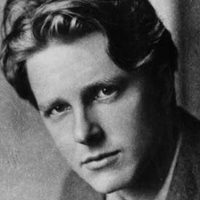Rupert Brooke - Biography and Works
Rupert Brooke was a poet born to distinction. Son of a Rugby master, he studied at his father's school and at King's College, Cambridge, and won many academic honors. He was born into a well-to-do-academic family. After graduation he settled down at Grastchester, a village near Cambridge, and devoted himself to literary pursuits. His athletic and intellectual gifts gained for him a large circle of friends and admirers.

Rupert Brooke (1887-1915)
When the Great War broke out in 1914 he obtained a commission in the Royal Navy and saw active service in the Mediterranean and there in 1915 he died of blood-poisoning in the island of Scyros. His death was deeply mourned in England both on account of his precocious talents that could not find fulfillment and because he became for his age the symbol of his country’s glorious youth sacrificed at the altar of war. A leader of Georgina poets, Rupert Brooke was pre-eminently the poet of youth. F. R. Leavis called him “the poet of a prolonged adolescence”; adolescence is his strength as well as weakness.
His poetry, at its best, is virtually an incantation of the spirit of youth-its idealism and gaiety, its cynicism and nonchalance, its love of fun and frolic, and its fondness for all that is good and beautiful. Yet both in his rapture and dejection there is an element of bravado, “an immaturity of exuberance.” Possessing the sensuousness of Keats, he sang in Public School accents on his favorite themes, love and death. Everything that he wrote has verbal and metrical melody. Beauties are abundant in such poems as The Great Lover, The Fish, The Soldier and Old Vicarage, Grantchester. Yet the actual quantity of his poetic output is small, and the intrinsic worth of his poetry as a whole is not very great. Like his Elizabethan counterpart Sir Philip Sidney, he endures as the brilliant promise of a poet rather than as a poet of substantial achievement.
Cite this Page!
Shrestha, Roma. "Rupert Brooke - Biography and Works." BachelorandMaster, 18 Nov. 2013, bachelorandmaster.com/biography/rupert-brooke.html.
Related Topics
The Soldier: Summary and Analysis
The Dead III: Summary and Analysis
The Great Lover: Summary and Analysis
The Fish: Summary and Analysis
 |
bachelorandmaster.com |